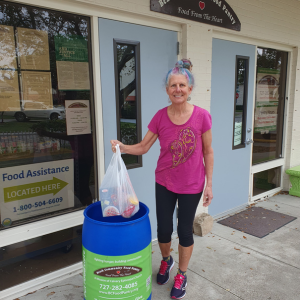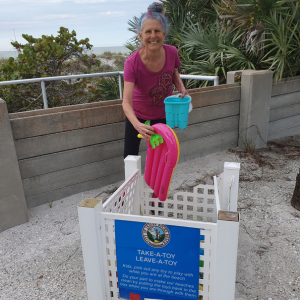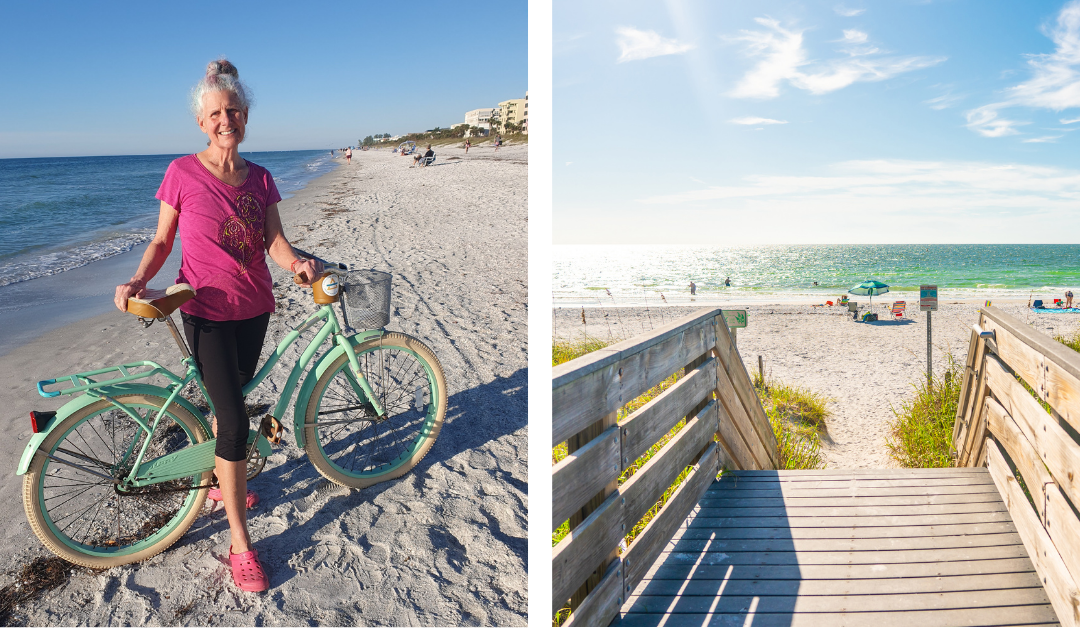Updated on March 15, 2024
From her career as a travel writer to her dual citizenship in the Netherlands and the United States, Diane Daniel’s path has been one of exploration, both of the world and of her values.
Her passion for hospitality and commitment to environmental sustainability shines through in her thick portfolio of articles featured in the Boston Globe, New York Times, Washington Post, and other publications.
However, it was her everyday frustrations as a vacation rental host that led her to found VacationDonations.org, a nonprofit dedicated to reducing waste and promoting sustainability in the short-term rental market.
From Florida to the Netherlands
Her role as vacation rental host came from splitting her time between the Netherlands with her Dutch wife and Indian Rocks Beach on the Gulf Coast of Florida.
Her love for Indian Rocks Beach, where she spent her teenage years, drew her back repeatedly, eventually leading her to buy a home in the beach town in 2007 and contribute to the local community.
“I’ve sort of become a snowbird because I have had connections to Florida since I was a teenager,” Diane said. Now, she lives in the state six to seven months a year – one of nearly 1 million seasonal Florida residents, according to University of Florida’s Bureau of Economic and Business Research.
When she would return to the Netherlands, she would rent out her home to short-term guests.
“I’ve been doing short-term rentals as a host for 15 years,” Diane said. “That’s what started my interest in sustainability in short-term rentals.”

Short-term rental waste
The inspiration for VacationDonations.org came from Diane’s own experiences managing her vacation rental from afar. Overwhelmed by the accumulation of leftover items and food waste from guests, she was tempted to throw it away. Instead, she decided to research where she could donate the items.
“I hate waste. I try to reuse, I buy a lot of things used,” she said. “I realized that I could donate so many things within literally a few blocks to two miles from my house.”
For example, she could donate towels and sheets still in good shape to charity stores, and towels in bad shape could go to animal shelters.
Vacation rental-sourced donations
With the burgeoning growth of vacation rentals, especially in the Sunshine State, Diane realized her challenge was a common one. In an effort to address the issue of waste at vacation rentals, she created VacationDonations.org, a comprehensive platform providing resources for donating leftover food, beach toys, books, and other items to local charities and organizations in Indian Rocks Beach.
Founded just last year, Vacation Donations initiative not only addresses the issue of waste in the short-term rental industry but also encourages community engagement and social responsibility.
“I have several missions. I have local resources for Indian Rocks Beach,” Diane said. “But I also want to spread awareness overall, in the state, in the country, in the world, about short-term rental waste.”

The website lists donation drop-offs around Indian Rocks Beach by category. It provides tips on how to join in the effort, such as picking up a magnet with a QR code that links to VacationDonations.org and adding donation drop-off tips in automated checkout messages.
Expanding awareness about STR waste
In Indian Rocks Beach, two condominium buildings and Plumlee Gulf Beach Realty have joined the Vacation Donations initiative by placing donation bins in their lobbies. Plumlee also mentions Vacation Donations in their checkout instructions and includes a brochure in their guestbook.
Through partnerships with local businesses and community leaders, she is expanding VacationDonations.org to other areas, starting with Siesta Key – a popular tourist destination in Florida.
“I can create a page of resources for any community. It’s really easy,” Diane said. “My mission is short-term rentals, mostly vacationers, so they can market in tourist communities with their own URL.”
Diane’s commitment to sustainability extends beyond her nonprofit work. In her own vacation rental properties, she practices waste reduction, furnishing them with used furniture and encouraging guests to recycle and donate their unused food and other items.
“I personally believe in reusing and not continuing to buy new things all the time,” she said. She takes pleasure in searching for secondhand finds and sharing with others where she bought something or how long she’s had it. On VacationDonations.org, she notes that she is pictured with her used beach bike, 15-year-old “Croc”-offs, and a $3 T-shirt from a local secondhand shop.
On April 2, 2024, Diane will host a free webinar: How Vacations Can Boost Food Donations.
Waste reduction challenges
Reducing waste at vacation rentals also presents several challenges, which she learned from her research on traveler behavior when they’re on vacation.
“I wrote a story for the Boston Globe … called ‘Pack your Principles,’” she recounted. “I interviewed a bunch of people who are fairly environmentally minded at home to find out if they followed those practices when they were on the road. And a lot of them admitted they do not because it’s a hassle, and these are people who are already doing that anyway. … Vacation is just a different mindset.”
Ultimately, it’s up to hosts and property managers to make it easy for guests to recycle or donate cast-off items. When they don’t donate those items, hosts and property managers can step in.
“Owners and managers are the ones making the money. The buck stops here,” Diane said. “They’re the ones that that I hope will step in and help certainly with food waste because it’s really a tragedy when people don’t have enough food to eat and we are throwing food away.”
Despite these challenges, Diane remains steadfast in her belief that change is possible, one vacation rental – one condominium building at a time.
“I just think the short-term rental industry has never been held accountable for its impact on the environment, but it should be,” she said. “If I can do my little part in the world to help that, then I want to do something.”
…


